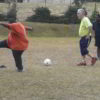Neuropsychiatric disorders are ranked third in the national burden of disease and one in six or 16.5% of South Africans suffer from a common mental disorder (according to results of a study published by SASH)¹; while the 2002 census figures showed that about 12% of the disabled population had a form of intellectual disability and this ranged from mild to very severe². Yet mental health is given scant attention on the national health policy agenda.
The most recent mental health legislation (the Mental Health Care Act) was enacted in 2002 and promulgated in December 2004. There is wide variation in the provincial health budget allocations to mental health (from 1% to 8%) and a 45-fold difference in the psychiatrist/population ratios between provinces. This is partly driven by the lack of clear national direction on budget allocations to mental health and the lack of an official national mental health policy. Stigma and ignorance continue to inform public opinion and mental health is poorly integrated into primary health care.
Over the years there has been a gradual shift from institutional care to community led care for people with mental illness or intellectual disability. However the lack of clear policy directives regarding descaling of institutional care and inadequate data on analysis of the needs of service users has resulted in under planning and insufficient provision of basic needs such as housing and health facilities for this sector of the population. Although mental health advocacy is gathering momentum in SA, intellectual disability is still an entity that is grossly under diagnosed in childhood and public awareness campaign efforts regarding the condition are very much in the infancy stages. As a result there are no clear cut policies or proper infrastructural procedures for young persons who fall within the broad spectrum of learning disabilities before they reach adulthood.
However, it is encouraging to note that the paradigm shift (from the medical to the social model) has come about largely through the development of strong organisations of disabled people (DPOs). Central to the concept of the social model of disability is the principle of self -representation by people with disabilities through DPOs.
One of the most important initiatives undertaken by the DPOs over the past few years has been the development of a number of charters, which express the demands and rights of people with disabilities in South Africa.
The Disabled People South Africa (DPSA) is the national assembly of disabled people in South Africa. DPSA is a national organisation of smaller community-based disabled people’s organisations. A number of national disability-specific DPOs, with international links, have also emerged over the years. These include the South African Mental Health Federation and the Down Syndrome Forum of South Africa. The South African Federation for Mental Health has embarked on an advocacy programme to develop the concept of self-representation by people with severe mental and/or intellectual disabilities.
¹ Findings from the first South African Stress and Health Study (SASH) http://www.mrc.ac.za/policybriefs/stresshealth.pdf
² Prevalence of disability in South Africa 2001 census http://www.statssa.gov.za/census01/html/Disability.pdf




